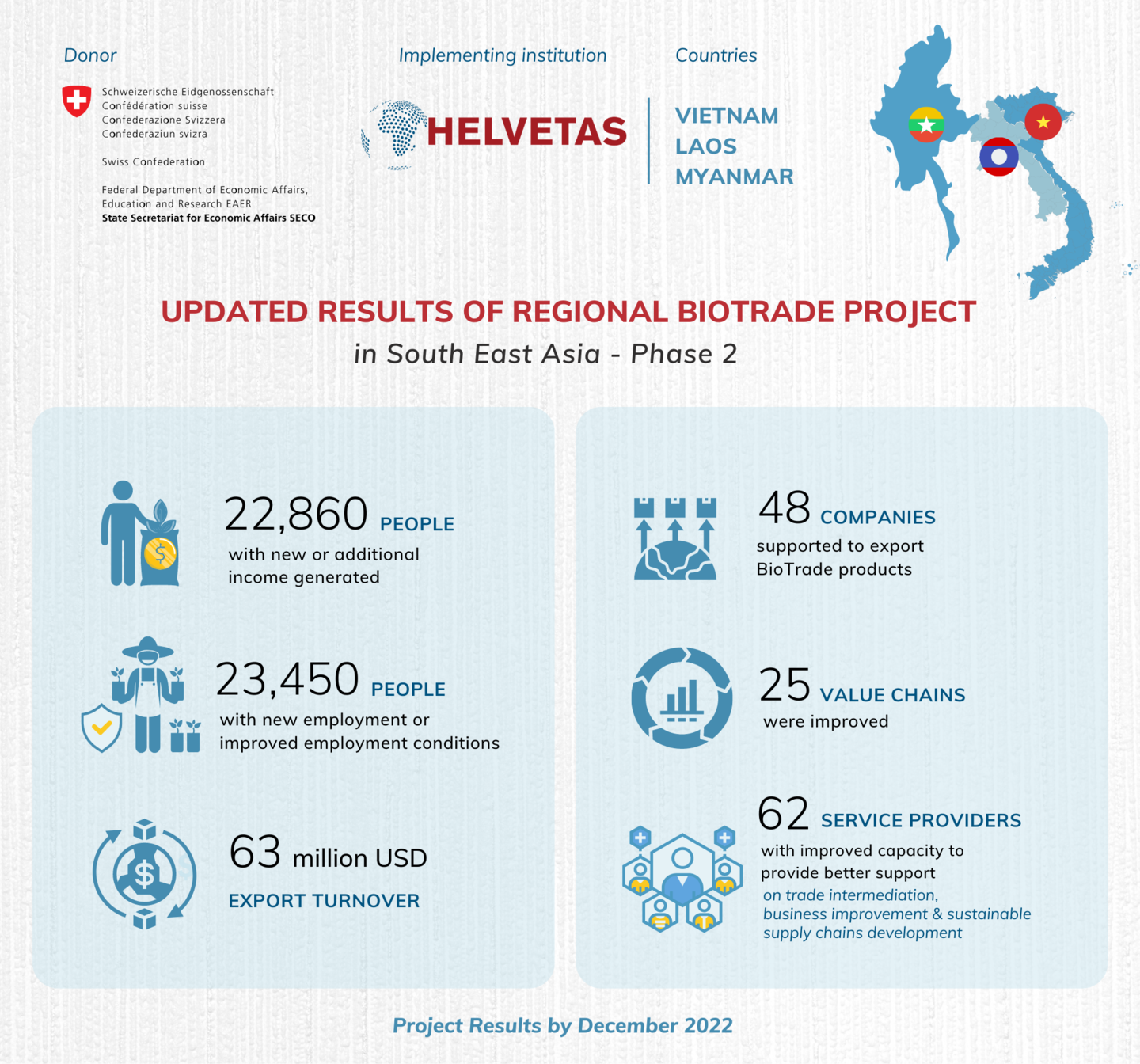In recent decades, countries along the Mekong region have experienced rapid economic growth and urbanization, but at the expense of increasing inequality and strong negative impacts on the environment and accelerated loss of biodiversity. Biotrade, an ethical and sustainable trade in resources derived from natural biodiversity, is a solution for these countries to tap high-end markets with improved quality and value-added products while protecting the environment and ensuring equitable benefit sharing among stakeholders. With a new Biotrade business model, the Regional Biotrade Project puts in place necessary services and other supports for self-sustaining sector growth.
-
Project NameRegional Biotrade Phase II
-
Project Phase2021 to 2024
-
FundingThis project is funded by the Swiss State Secretariat for Economic Affairs (SECO).
-
Thematic focusPrivate Sector Development
An upscaling of a sustainable and ethical trade model
More cassava. More palm oil. More rice. More everything. And as cheap as possible. The large-scale production of foodstuffs for foreign markets takes its toll on the health of agricultural workers and the environment, putting especially heavy pressure on highly biologically diverse ecosystems, as in Vietnam, Laos and Myanmar.
Exporting herbs, flowers, roots and saps to high-income countries is a viable and sustainable alternative to mass production of foodstuffs. Botanicals that have been used for generations to heal ailments or preserve beauty in Southeast Asia are increasingly in demand in the phytopharmaceutical and cosmetics industries in developed countries. BioTrade represents a great opportunity for countries like Vietnam, Laos, Cambodia and Myanmar. BioTrade protects forests because many of the plants concerned only thrive in intact ecosystems. It creates jobs because gathering or growing the plants is labor-intensive. And because fair prices are an integral part of the concept, it improves earnings across the board, from harvesters and farmers to workers and salaried employees in the processing, distributing, and selling of these natural products.
During the first phase of the Regional Biotrade project in Southeast Asia, Helvetas worked with traders, processors and import and export companies that integrate the core values of sustainable use of the environment and social ethics into their everyday business practices. We successfully introduced the new concept of Biotrade into regional supply chains and established significant new exports of Biotrade products from Mekong region countries.
Upon these achievements, the project puts greater focus on the business supporting services and communication needed in the sector. We work with market systems actors and facilitate the transition of their roles in ways that permanently transform how the system works, contributing to the self-sustaining of Biotrade sector and the equitable and sustainable economic growth of the region.

More information
-
BioTrade Case Studies: Cinnamon in Vietnam (phase II)PDF (0.89 MB)
-
BioTrade Case Studies: Cinnamon and Star Anise in the Cao Bang Landscape, VietnamPDF (4.87 MB)
-
Biotrade Case Studies: Tea in Lao People's Democratic Republic (Phase II)PDF (1.02 MB)
-
Biotrade SECOPDF (2.81 MB)
-
UNCTAD BioTrade Initiative BioTrade Principles and CriteriaPDF (0.1 MB)
-
Regional Biotrade Project in Southeast Asia (Phase II)PDF (0.45 MB)
-
Mainstreaming Biodiversity Conservation Into Trade in ASEANPDF (2.67 MB)













